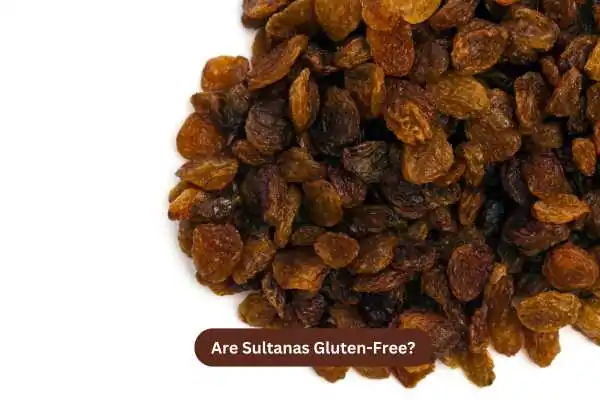For those following a gluten-free lifestyle—whether due to coeliac disease, gluten intolerance, or a personal health choice—knowing exactly what’s safe to eat is essential. One common pantry item that often sparks questions is sultanas. These sweet, dried grapes are popular across the UK for baking, snacking, and cooking, but are sultanas truly gluten-free?

In this article, we explore whether sultanas contain gluten, how they’re processed, and what to watch out for when buying them. We’ll also provide helpful guidance on safely incorporating sultanas into a gluten-free diet.
What Are Sultanas?
Sultanas are dried seedless grapes, typically from the Thompson Seedless variety. Known for their golden colour and natural sweetness, they’re widely used in UK households in fruit cakes, breakfast cereals, and even savoury dishes like couscous or tagines.
Unlike raisins and currants, sultanas are usually treated with a preservative like sulphur dioxide to maintain their colour and extend shelf life. But aside from their visual and flavour profile, many gluten-free consumers wonder whether any part of the drying or packaging process could introduce gluten.
Are Sultanas Naturally Gluten-Free?
Yes—sultanas are naturally gluten-free. Grapes, the fruit they are made from, contain no gluten. This makes plain, unprocessed sultanas safe for people with coeliac disease or gluten sensitivity in their natural form.
However, the real concern isn’t the fruit itself—it’s what can happen during processing, packaging, and cross-contamination.
The Risk of Cross-Contamination
In the UK, many dried fruits, including sultanas, are processed and packaged in factories that also handle wheat, barley, or rye products. As a result, there’s a risk of cross-contamination with gluten-containing grains during:
-
Drying on shared equipment
-
Packaging in facilities that handle gluten
-
Bulk transport or storage near gluten products
If you have coeliac disease or require a strictly gluten-free diet, even trace amounts of gluten can cause serious health issues. For this reason, it’s vital to check product labels carefully.
What to Look for on Labels
When shopping for sultanas in the UK, always look for labels that clearly state “gluten-free.” This means the product has been tested and meets the UK legal requirement of containing less than 20 parts per million (ppm) of gluten.
Look out for:
-
“Gluten-Free” Certification: This ensures the product is safe for coeliac consumption.
-
Allergen Warnings: Avoid any products that say “may contain gluten” or “produced in a facility that also processes wheat.”
-
Ingredient Lists: Some brands may add flour or anti-caking agents during processing—always read the fine print.
Brands that specialise in free-from foods or health food stores often carry certified gluten-free sultanas, giving extra peace of mind.
Safe Brands and Where to Buy
Many UK retailers and health food brands offer gluten-free sultanas. While availability can vary, look for products from:
-
Holland & Barrett
-
Biona Organic
-
Crazy Jack Organic
-
Whole Foods Market UK
-
Tesco Free From or Asda Free From ranges
When shopping online, ensure the product description includes gluten-free assurance, and double-check customer reviews for feedback on packaging and cross-contamination concerns.
Are Organic Sultanas Gluten-Free?
Organic sultanas are often marketed as more natural and free from additives, which can be appealing to gluten-free consumers. However, organic does not automatically mean gluten-free.
Organic sultanas can still be processed in shared facilities. Again, check for specific gluten-free labelling or contact the manufacturer if you’re unsure about production practices.
Using Sultanas in a Gluten-Free Diet
Sultanas are a versatile ingredient and can be a delicious addition to many gluten-free meals and snacks. Here are a few gluten-free ways to enjoy them:
-
Gluten-Free Porridge: Stir sultanas into your morning oats made from certified gluten-free oats.
-
Baking: Add to gluten-free banana bread, muffins, or scones.
-
Salads: Toss into quinoa, rice, or lentil salads for a natural sweetness.
-
Trail Mix: Combine with nuts, seeds, and gluten-free dark chocolate for a high-energy snack.
They’re also a great natural sugar alternative for sweetening desserts or sauces without adding processed sugar.
Nutritional Benefits of Sultanas
Beyond being gluten-free, sultanas are a good source of:
-
Natural sugars for quick energy
-
Dietary fibre, supporting digestion
-
Iron and potassium, which help with blood health and muscle function
-
Antioxidants, protecting cells from damage
That said, like all dried fruit, sultanas are calorie-dense, so they’re best enjoyed in moderation—especially for those monitoring sugar intake.
Final Thoughts
So, are sultanas gluten-free? In their natural, unprocessed form—yes, absolutely. But when it comes to buying them in stores, the key is vigilance. Cross-contamination during processing is a genuine concern, particularly for individuals with coeliac disease or severe gluten intolerance.

